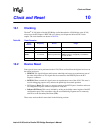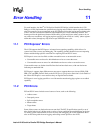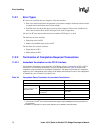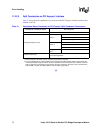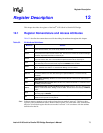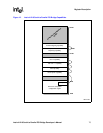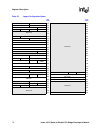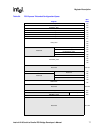
70 Intel
®
41210 Serial to Parallel PCI Bridge Developer’s Manual
Error Handling
11.2.1 Error Types
PCI errors are classified into two categories: fatal and non-fatal:
• Fatal errors are those that have the potential to cause data corruption. Software must be careful
to contain and escalate these errors (when needed).
• Non-fatal errors are those that do not cause any data corruption. These errors include driver
errors such as master-abort on PCI and target errors such as target-abort.
All errors on PCI are uncorrectable and are forwarded to PCI Express* as such.
The fatal class of errors includes:
• Data parity errors on PCI
• Address and attribute parity errors on PCI
The non-fatal class of errors includes:
• Target Aborts on PCI
• Master Aborts on PCI
11.2.2 Termination of Completion Required Transactions
11.2.2.1 Immediate Termination on the PCI-X Interface
An immediate termination occurs when the 41210 Bridge masters a transaction on PCI or PCI-X
and receives an “immediate termination” response for that transaction. Table 29 describes the
completion-status translation for immediate terminations. The behavior described for completion-
required cycles is independent of the setting of the Master Abort Mode bit, and is also independent
of whether the cycle is exclusive (locked) or not.
Table 29. Completion-Status Translation for Immediate Terminations
PCI-X Termination PCI Express* Completion
Normal completion Successful
Normal completion with
data parity error
Memory, I/O, configuration reads Successful with poisoned TLP
Configuration, I/O writes
1
UR
Configuration write to special cycle
conversion
2
Successful
Master abort UR
Target abort CA
NOTES:
1. In PCI mode, the Intel
®
41210 Serial to Parallel PCI Bridge samples PERR# asserted and generates the
UR completion.
2. PERR# is not signaled for a special cycle data parity error. SERR# is asserted instead.






